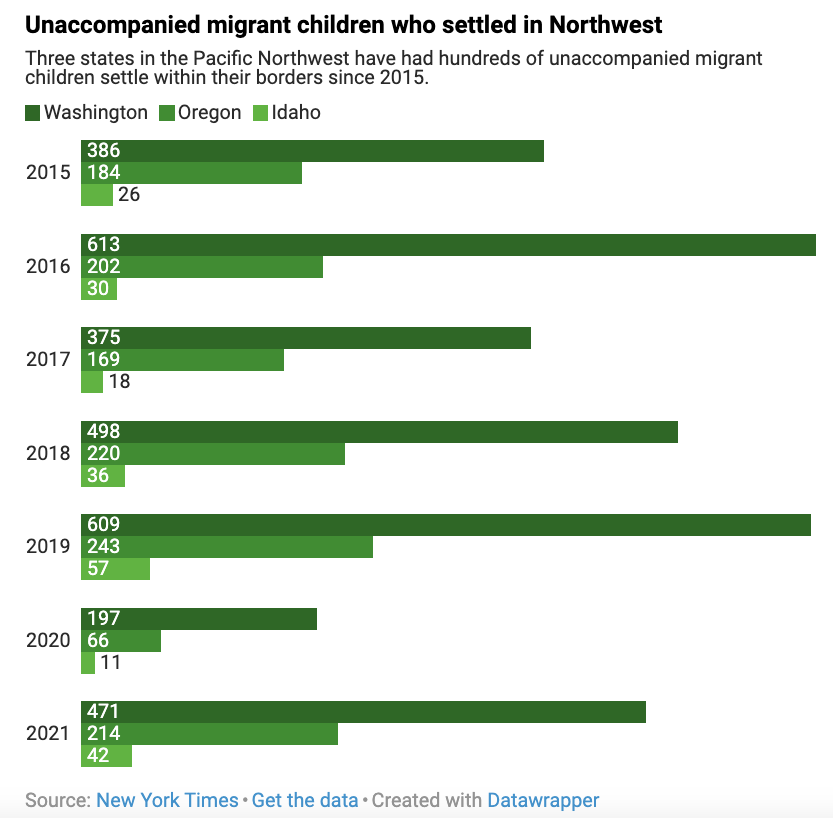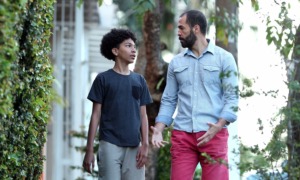This story was originally published by InvestigateWest.
![]()
Few children who arrive at the border alone have access to help navigating the immigration system
![]()
The children show up at the border alone, often making perilous journeys of hundreds of miles to escape violence and poverty.
When they arrive in the U.S., they face a new set of challenges: navigating a complicated and confusing immigration system. Immigration advocates consider them the most vulnerable migrants in the country.
The Pacific Northwest experience
The children show up at the border alone, often making perilous journeys of hundreds of miles to escape violence and poverty.
But most of the unaccompanied minors who have settled in the Pacific Northwest in recent years have no access to legal representation, leaving them on their own to navigate a system seeking to deport them.
Now, with the incoming administration of President-elect Donald Trump, migrant children and their advocates fear what may befall them in the months to come and anticipate even further shortages of legal assistance. Trump has pledged to deport millions of undocumented immigrants and a conservative group supporting him has called for eliminating protections for unaccompanied migrant children and speeding up the process for their deportation.
“I hear from children themselves who say they are scared or nervous about the unknown, and more often than not, there isn’t a straightforward answer,” said Juliana Pinto McKeen, a social worker with The Young Center for Immigrant Children’s Rights, a nonprofit that provides legal aid to unaccompanied children. “Children are really kept in limbo.”
More than 4,000 unaccompanied children moved in with sponsors in Washington, Oregon and Idaho between January 2015 and May 2023, according to data obtained and shared by the New York Times. Allowed to enter the country, they go through judicial proceedings to determine whether they will be allowed to remain. Many have to navigate their immigration cases on their own, due to a small number of immigration attorneys in rural areas of the Pacific Northwest and even fewer that offer pro bono services.
According to data obtained by the Executive Office of Immigration Review, as of 2017 over 3,000 unaccompanied children in Washington, Oregon and Idaho did not have legal assistance in their deportation cases.

Courtesy VECINA
Molly Chew, project director for VECINA.
Kids In Need of Defense (KIND), an organization that provides children with pro-bono legal services, found that the success rate for gaining legal status is five times higher when an unaccompanied minor has professional representation.
Molly Chew, the Portland-based project director for VECINA, an organization that assists families wanting to sponsor migrant children, worries about how Trump’s deportation policies could affect communities in the Pacific Northwest.
“Some of our bigger farmworking communities are pretty at risk,” she said. “And in speaking with attorneys in the farmworking field, they’re all trying to prepare themselves and their clients for these possibilities.”
‘A challenge to get to immigration court’
“In the cases where they make mistakes, the consequences are so severe.”
Samual Smith, immigration lawyer
After the children are detained at the border, they are placed with sponsors, who are usually distant relatives or family friends, by the Office of Refugee Resettlement.
Some sponsors are undocumented or former migrants themselves, and many live in the farmworking and rural parts of the Pacific Northwest, like Shelton, Washington or Woodburn, Oregon.
Hundreds of other children live with sponsors in Eastern Washington.
Migrant advocates say it is best for the child to live with people they know or are related to, but rural areas lack the legal and case management resources.

Courtesy Cindy Liou
Cindy Liou, immigration lawyer and vice president of U.S. and State and Local Policy for KIND.
“As we see growing numbers of children in Eastern Washington, it is a challenge for them to get to immigration court in Seattle,” said Cindy Liou, vice president of U.S. and State and Local Policy for KIND. She is based in Seattle.
According to the Executive Office of Immigration Review, as of 2017, just 26% of unaccompanied migrant children in Washington who had deportation cases pending had legal representation in their cases. In Oregon, just 35% of children did. There was no data available for Idaho.

“A big concern for unrepresented individuals is making sure that they have their due process rights respected and understand the rights they have,” said Samuel Smith, an immigration lawyer and director of immigrant legal aid services at Manzanita House, a Spokane-based nonprofit that supports immigrants and refugees.
Immigration cases, and especially those involving deportation, are complicated and time-consuming. Immigration attorneys are needed to file motions to reopen cases that might have been already ordered for deportation or file for time extensions, all of which would be difficult for a child to navigate alone, Smith said.
“Removal defense cases are incredibly complex,” he said. “We want to make sure that if we’re taking someone’s case, that we have the time and the knowledge base to do a good job.”
Immigration process mistakes can have severe consequences
For migrant children, the consequence of making a mistake in the process can be significant.
“If you don’t show up to court, you could be ordered removed in absentia,” Liou said. “In places like the Pacific Northwest, where there isn’t necessarily public transportation infrastructure, it is difficult for some children to get to court. There might be children in Eastern Washington, if their adult family members or caregivers are farm workers or have certain kinds of jobs, it can be difficult to get to court on time since it’s a many hour drive.”

Courtesy Manzanita House
Samuel Smith, immigration lawyer and director of immigrant legal aid services at Manzanita House, Spokane, Wash.
Smith recently worked with an unaccompanied migrant child who was previously navigating their case alone. The client was ordered deported for unintentionally missing a court hearing.
“They were making good-faith attempts and didn’t know their case was at a different location. We were lucky enough to show up with them and the judge reopened the case,” Smith said. “In these cases, when they make mistakes, the consequences are so severe.”
The Migration Policy Institute, a nonpartisan think tank that seeks to improve U.S. immigration policies, wrote in a 2021 report that unaccompanied migrant children in rural areas have a difficult time accessing legal, medical, and mental-health services, particularly at a low cost and close to their homes.
Those services can drastically change the course of the children’s lives, Smith said.
“You need to be consistent and present when working with a child,” Smith said. “And that is hard with the level of resources and capacity we have in the region.”

Courtesy Nicole Derden
Nicole Derden, immigration attorney, Boise, Idaho.
Nicole Derden, an immigration attorney in Idaho, said that when she started practicing immigration law in the state in 2004, there was not a single entity that offered pro-bono immigration legal services. Since then at least one other law firm, Community Council of Idaho’s Familias Unidas Legal Services, offers some pro-bono immigration legal services.
The lack of immigration attorneys affects even those who have the money to pay. Derden said she thinks many attorneys aren’t drawn to the region because they assume there aren’t many immigrants who need legal aid in the Pacific Northwest, which she said is untrue.
“It affects all the immigrants in our state that we don’t have a lot of attorneys that practice this area of law, but we really don’t have the resources to even service the people that can pay for counsel, so where are you going to find the resources for people who can’t pay for counsel?” she said.
Uncertainty and fear about new administration
Eight years ago, a 15-year-old boy fled a murderous gang in Honduras, crossing Central America alone, often riding atop trains and encountering more violence as he traveled.
Eventually he made it to Washington state, where he faced a new set of challenges: navigating immigration court hearings, trying to protect himself from deportation, and arranging for medical exams on a meager wage.
Several organizations that work with unaccompanied migrant children declined to be included in this report out of concern for their clients’ safety.
He was fortunate that he received help from Kids in Need of Defense, or KIND, which helped him along the path to becoming a lawful permanent resident of the U.S.
The boy faced financial challenges even with the pro-bono help from KIND. He was required to pay $500 to submit a medical exam required for those seeking to become lawful permanent residents. On a painter’s wage of $1,200 per month, he couldn’t find the money. But eventually KIND got him the services he needed for a lower cost.
Even as he prepares to become a lawful resident, he is fearful of the incoming Trump administration. KIND shared some details of his story with InvestigateWest, but he declined to be interviewed.
“Post-election, our client is concerned about talking to the media,” a spokesperson from KIND wrote. “He is not comfortable discussing his story beyond this.”
Other clients are concerned as well. InvestigateWest contacted several organizations that work with unaccompanied migrant children in the Pacific Northwest and nearly all of them declined to be included in this report out of concern for their clients’ safety.
Trump ending birth-right citizenship and deporting families
Smith said many of the immigrants who seek help from Manzanita House have withdrawn from legal assistance and are beginning to plan to “self-deport” out of fear for their families.
“So the only way you don’t break up the family is you keep them together and you have to send them all back, even kids who are here legally.”
President-elect Trump
“People are fearing that they really have no opportunity here, and worry that their family and their lives are going to be really negatively impacted by the policies that might be implemented,” he said.
Their fears aren’t without merit. Organizations like the Young Center are preparing for an administration that will directly target their clients and their sponsor families.
Trump has promised to end birth-right citizenship for children born in the U.S. to undocumented parents. He said he will deport entire families, even members with U.S. citizenship or legal status, if other members are undocumented.
“I don’t want to be breaking up families,” Trump said in a recent interview with NBC. “So the only way you don’t break up the family is you keep them together and you have to send them all back, even kids who are here legally.”
On the campaign trail, and in interviews since, Trump has continued to say he plans to carry out the “largest deportation in U.S. history.” But organizations remain uncertain exactly what to expect.
[Related: Potential for immigration arrests at schools under Trump spurs push to shield families]
Mina Dixon Davis, a senior policy analyst with the Young Center, said in a news conference following the election that under the second Trump administration, they “anticipate an escalated and unprecedented assault on the basic human rights of refugees, asylum seekers, undocumented immigrants, as well as some who have received certain protected statuses.”
Project 2025 recommendations
In the Heritage Foundation’s Project 2025, a policy “wish list” from the conservative think tank for the next Trump presidency, the organization recommends Congress repeal the Trafficking Victims Protection Reauthorization Act, which allows children who are victims of human trafficking to remain in the U.S. for an initial four years if they are deemed eligible.
The Project 2025 document also suggests Congress should allow unaccompanied migrant children to be quickly deported, without being settled with a sponsor as their immigration case moves through the court system.
[Related: How could Project 2025 change education?]
At least some of the ideas have broad support, spurred by record border crossings by undocumented people in recent years. Some recent polls show that a majority of voters support mass deportations.
Are child trafficking concerns valid?
During the presidential campaign, Trump and his allies accused the Biden administration of losing track of thousands of unaccompanied migrant children. Chew, who previously assisted children with post-release services, said that claim comes from the fact that some children and their sponsors did not answer follow-up phone calls from the Office of Refugee Resettlement, not necessarily because they are dodging their legal cases.
Other immigration experts said the children who are unaccounted for might have fallen through the cracks between the government agencies that handle their cases and the paperwork could have been sent to incorrect addresses at no fault of the child.
If that sponsor and that child do not answer that phone call, they are marked as missing, she said. While the threat of child trafficking and abuse is a concern for unaccompanied children, they are not missing at the level Trump has repeated, Chew said.
Sponsor families are afraid of deportation
A Trump presidency also makes sponsor families scared to participate in the program, Chew said.
Many sponsor families are undocumented or may have undocumented people living in their household and they worry that being a sponsor family could put them at risk of deportation, Chew said. That results in unaccompanied migrant children having to stay longer in detention centers or shelters.
Chew said that under the current policy, the Office of Refugee Resettlement does not share information about undocumented sponsor families with the Department of Homeland Security for immigration enforcement, but she worries a Trump administration could undo those protections.
[Related from 2018: Trump’s immigration policy pushing children Into foster care]
“Just knowing how this went under the previous Trump administration, when sponsors and their household members did get picked up,” Chew said. “It didn’t happen to every sponsor, but that is something that happened. I was involved in a lot of cases where I saw sponsors or their household members get picked up by ICE and ultimately, they were deported.”
[Related Grant Opportunity: Community organizing and development for social justice grants]
***
Rachel Spacek, based in Boise, Idaho, is a Report for America corps member, reporting for InvestigateWest. For the last five years she has covered Latino affairs in Idaho and migrant labor and equity in the Pacific Northwest. Spacek interviews workers, advocates and elected officials in English and Spanish about working conditions and labor issues.
Report for America is a national service program that places journalists into local newsrooms to report on under-covered issues and communities. An initiative of the nonprofit media organization, The GroundTruth Project, it is structured to harness the skills and idealism of an emerging group of journalists plus the creative spirit of local news organizations.
InvestigateWest is an independent news nonprofit dedicated to change-making investigative journalism in the Pacific Northwest. Sign up for their Watchdog Weekly newsletter to receive stories like this one in your inbox.




























